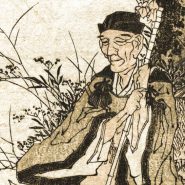By Robert Frost (1913)
I dwell in a lonely house I know
That vanished many a summer ago,
And left no trace but the cellar walls,
And a cellar in which the daylight falls,
And the purple-stemmed wild raspberries grow.
O’er ruined fences the grape-vines shield
The woods come back to the mowing field;
The orchard tree has grown one copse
Of new wood and old where the woodpecker chops;
The footpath down to the well is healed.
I dwell with a strangely aching heart
In that vanished abode there far apart
On that disused and forgotten road
That has no dust-bath now for the toad.
Night comes; the black bats tumble and dart;
The whippoorwill is coming to shout
And hush and cluck and flutter about:
I hear him begin far enough away
Full many a time to say his say
Before he arrives to say it out.
It is under the small, dim, summer star,
I know not who these mute folk are
Who share the unlit place with me—
Those stones out under the low-limbed tree
Doubtless bear names that the mosses mar.
They are tireless folk, but slow and sad,
Though two, close-keeping, are lass and lad,—
With none among them that ever sings,
And yet, in view of how many things,
As sweet companions as might be had.
Analysis
“Ghost House” turns a ruined homestead into an emblem of haunted persistence. The speaker dwells among raspberries, bats, and nameless graves, finding quiet companionship in decay. Frost’s careful rhymes and slow rhythm evoke the stillness of reclamation as nature covers the traces of human habitation. The imagery — cellar walls, wild grapevines, and mossed stones — turns loss into renewal.
What might sound gothic becomes elegiac. The “mute folk” beneath the low-limbed tree are not threatening but enduring neighbors. The poem’s calm acceptance of ruin anticipates Frost’s larger vision: that the boundaries between life and death, presence and absence, are porous. “Ghost House” is less a lament than a meditation on belonging to time itself.
